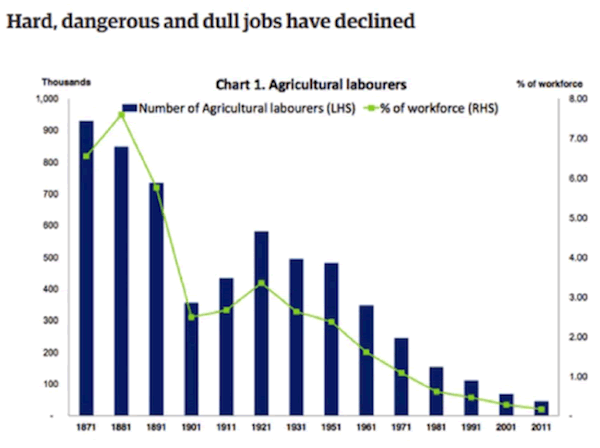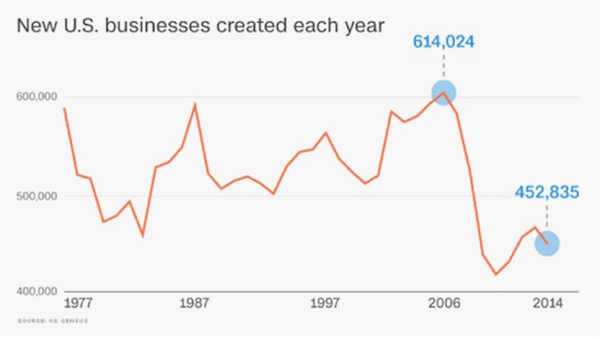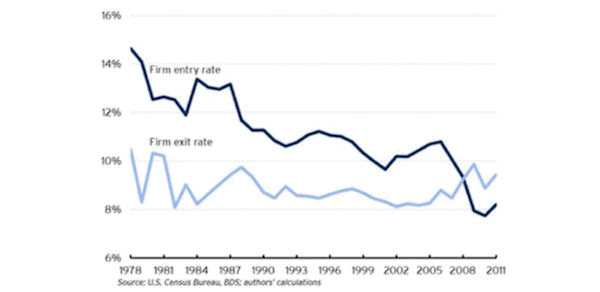Startups Will Define the Future of US Employment
Economics / Employment Mar 15, 2017 - 09:21 AM GMTBy: John_Mauldin
 Research shows that technology has net-net created far more jobs than it has destroyed. A recent study by Deloitte drew on data going back to 1871 in England and Wales and found that technology has been a job-creating machine.
Research shows that technology has net-net created far more jobs than it has destroyed. A recent study by Deloitte drew on data going back to 1871 in England and Wales and found that technology has been a job-creating machine.
Part of that is because technology increases people’s spending power, which creates a surge in the demand for hairdressers, bar staff, etc.
Going back over past jobs figures paints a more balanced picture, say authors Ian Stewart, Debapratim De and Alex Cole.
“The dominant trend is of contracting employment in agriculture and manufacturing being more than offset by rapid growth in the caring, creative, technology and business services sectors,” they write.
“Machines will take on more repetitive and laborious tasks, but seem no closer to eliminating the need for human labour than at any time in the last 150 years.”

This Happened in Every Technological Revolution
The pattern has repeated in the US and much of the rest of the world.
At least 80% of US workers labored in agriculture at the beginning of the 19th century, but by the middle of that century, the number was down to 50%. Today, it is substantially less than 2%.
And yet we are 16 times more productive than we were 120 years ago.
Seriously, do we bemoan the fact that we’ve lost all those farm jobs? Only if you never had to actually do one of those jobs. And that our food is much less expensive as a percentage of our daily budget? (Unless your spouse forces you to eat everything that is simply labeled organic.)
Do we regret all the people who lost jobs from doing our laundry? Washing our restaurant dishes? Shoveling horse droppings from the street? Oh, you might miss your bank teller, but then you never go to see her/him anymore, do you?
All those jobs are gone.
Is Technology Really the Problem?
So now I am here to tell you that technology is not the problem. As I’ve written before, technology is the solution. Well, actually, I agree it’s the problem if it’s your job.
But the solution is to figure out how to get in front of the technology curve or figure out who is in front of it and get involved with them.
Because, at the end of the day, the data shows that net-net, new job creation comes from small business startups. That is, all of the net new job creation comes from small businesses less than five years old.

Well, hooray! We are still creating 450,000 new businesses a year. Well, except. Except that we are losing more enterprises every year than we are creating. And we have been since the beginning of the Great Recession.

Startups Will Define the Future of US Employment
Part of the problem, as Tyler Cowen describes in his new book, The Complacent Class, is that Americans have seemingly lost some of their entrepreneurial drive.
In the 1980s, new startups accounted for some 12–13% of all businesses. Today it’s 7–8%. If we want to create an economy that is a jobs machine, we are going to have to have more business startups.
Which means that we have to create a climate in which people feel comfortable launching risky new ventures.
Fewer new businesses means that older companies now represent the largest share of US businesses; and all the data—and I challenge you to find any data that contradicts this (seriously, I would like to see it)—shows that large businesses, as a group, are not net creators of new jobs.
They absolutely create new jobs at the front door, but at the back door they are ushering out old jobs. Large businesses are in the business of staying in business.
Large enterprises are net-net destroyers of jobs. For every Google or Apple that is growing its total number of higher-paying jobs, there is a Buggy Whip Corporation or Icebox Corporation that once dominated its industry but is now either defunct or shedding jobs in an effort to stay viable—or else scrambling to change its model and product delivery entirely.
And let’s remember, Google and Apple were once small business startups that for whatever reason (perhaps the genius of their founders) became big and dominant.
The future is not in old companies that are just getting by or fading. The jobs of the future are in new companies that have yet to be dreamed up. But they will all have to be found and financed.
Jobs Come from Blood, Sweat, and Big Money—Not a “Jobs Program”
New-business creation is an extraordinarily risky business. Michael Gerber tells us that 80% of all new businesses fail or no longer exist in their original form within the first five years, and 80% of the remaining businesses no longer exist five years after that.
And every one of those new ventures and the half a million new businesses started every year requires capital. Every $%^&$&^% one of them. Blood and sweat and tears and lots of money. And that money has to come from somewhere.
There are many politicians who think there is a new-jobs fairy. Just give the government more money, and it can create a “jobs program” that will create those new jobs.
Okay, now I’m going to be the guy who told your kids there is no Santa Claus.
There is no jobs fairy. Just call me Mr. Grinch.
Get a Bird’s-Eye View of the Economy with John Mauldin’s Thoughts from the Frontline
This wildly popular newsletter by celebrated economic commentator, John Mauldin, is a must-read for informed investors who want to go beyond the mainstream media hype and find out about the trends and traps to watch out for. Join hundreds of thousands of fans worldwide, as John uncovers macroeconomic truths in Thoughts from the Frontline. Get it free in your inbox every Monday.
John Mauldin Archive |
© 2005-2022 http://www.MarketOracle.co.uk - The Market Oracle is a FREE Daily Financial Markets Analysis & Forecasting online publication.



